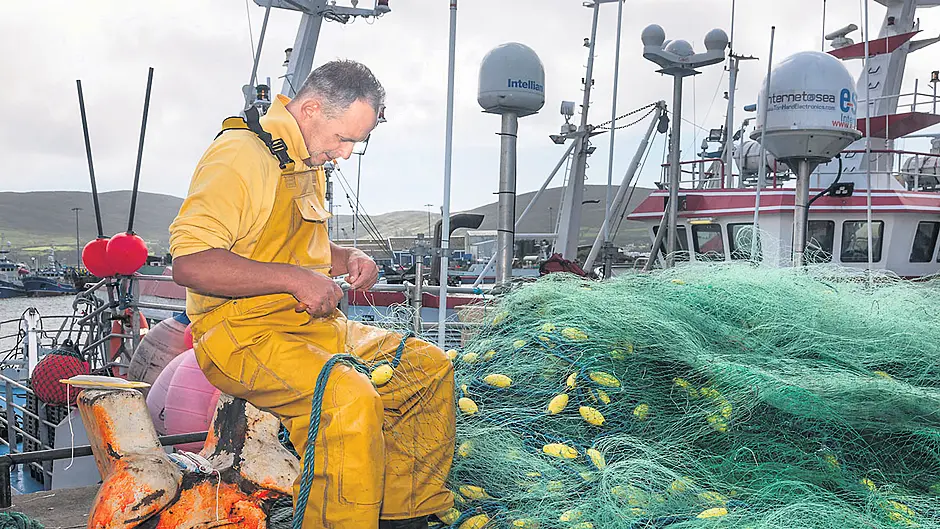South and West Fish Producers spokesman Patrick Murphy has just issued a very stark warning about the future of the Irish fishing industry – and its massive role in the economy of West Cork. Locals really don’t realise just how dangerous a no-deal Brexit could be to this area, he says.
PATRICK Murphy’s stark summing-up of the current state of the Irish fishing industry is not breaking news to those involved.
But it will come as a surprise to many people in West Cork that fishing accounts for such a huge chunk of the local economy.
When you think about the businesses that supply the hundreds of vessels operating off the south coast, it quickly becomes obvious why the industry must be protected here.
Even medium-sized trawlers will use thousands of euro of diesel every year, and a modest operator will take on board about €500 or €600 worth of groceries to feed a small crew for a week.
Local supermarkets cannot underestimate the value of such customers – multiply that by 52 for just one boat and you begin to see what one crew’s annual food order can mean for a local shop.
Due to the shortage of young fishermen and women, some ports will also benefit from an influx of non-local crew from time-to-time, renting local properties and using services.
Then there are the associated fish factories and fish shops and transport and its associated costs, all boosting local economies. ‘We are a coastal community here in West Cork and the local people have been a little bit taken aback by what is happening now because they have never realised the importance of the fishing industry,’ says Patrick.
‘They never understood the amount of contribution that the industry is actually having,’ he says in a recent Southern Star Coronavirus podcast.
He quotes the Bord Iascaigh Mhara (BIM) report into the economic drivers in Castletownbere and the Beara peninsula in general.
BIM found that fishing accounted for 84% of the local economy.
‘It’s the engine that drives the economy of Beara. They didn’t do the report in Union Hall or Baltimore, to the best of my knowledge. But there is a fish factory in Baltimore that provides jobs. So if you take these out of our communities, you won’t have them replaced.’
A no-deal Brexit will see Ireland lose half its fishing grounds and that could come on top of reduced markets due to Covid-19’s impact.
‘We could see an influx of up to 400 vessels currently fishing in the UK waters, so we have 180 of our own vessels and 50 or 60 of them do the majority of their fishing in UK waters – they will have to come home. And if you get another 200-300 boats in on top of that, you are talking about a 300-400% increase. We have asked for those figures to be analysed to see what effect that will have on the stocks and the biomass around here – so it’s not just what we lose, it’s the future, too.’
He says fishermen have already made massive sacrifices down the years. ‘You can see it on a computer screen where they move from [fishing] grounds to grounds to grounds, not to catch fish, but to avoid them, because the quotas are so tight.’
And then there will be the added pressure of going through the UK to get to Europe, ‘facing the French on the other side, making sure they allow our fish in’, and the added pressure on the Irish waters from extra trawlers depleting the stocks, and it’s all coming down the tracks in four months’ time. ‘So if you add this into the mix it’s an absolute disaster,’ says the lobbyist. ‘We have the nursery grounds of Europe, so if we destroy them ... that’s it. Game over.’
The plight of Irish fishermen and, in particular, our fishing fleet in Castletownbere, was documented earlier this year in an excellent TG4 documentary Gafa Sna Líonta. ‘Fishing in Ireland gets very little airtime, despite being an industry worth over €1.22bn to the country,’ producer/director Darina Clancy told The Southern Star.
‘And that’s with only 4% quota in our own waters. I’ve always had a huge interest in maritime issues and fishing gets little or no airtime on our national airwaves – aside from when there’s a tragedy.’
Watch Gafa Sna Líónta (part of the Tabú series) on the TG4 player, or by Googling ‘TG4 Gafa Sna Lionta’.








